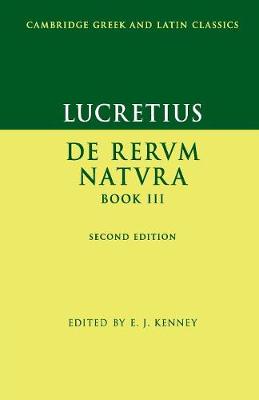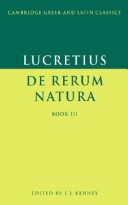Cambridge Greek and Latin Classics
2 total works
The third book of Lucretius' great poem on the workings of the universe is devoted entirely to expounding the implications of Epicurus' dictum that death does not matter, 'is nothing to us'. The soul is not immortal: it no more exists after the dissolution of the body than it had done before its birth. Only if this fact is accepted can men rid themselves of irrational fears and achieve the state of ataraxia, freedom from mental disturbance, on which the Epicurean definition of pleasure was based. To present this case Lucretius deploys the full range of poetic and rhetorical registers, soberly prohibitive, artfully decorative or passionately emotive as best suits his argument, reinforcing it with vivid and compelling imagery. This new edition has been completely revised, with a considerably enlarged Commentary and a new supplementary introduction taking account of the great amount of new scholarship of the last forty years.
The De Rerum Natura of Lucretius is a sustained and impassioned protest against religious superstition and irrationality. The poem takes the form of a detailed exposition of Epicurean physical theory - an extreme materialism designed to remove and discredit popular fears of the gods, death and an afterlife. Book III is generally accepted to be the finest in the whole poem; Lucretius argues there that the soul is as mortal as the body and shows that human response to the fact of mortality and death can be at once rational, dignified and liberating. Professor Kenney's commentary is the first to give proper critical emphasis to the techniques and intentions of Lucretius' poetry; it can be read with profit by all students of Latin from senior school level upwards.

